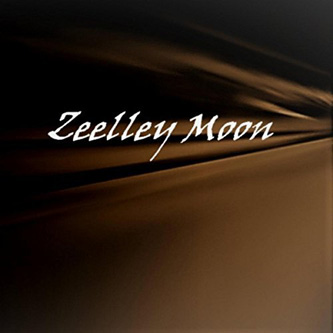 With
many long respected artists backing off from making what is now known
as “physical” product, and now going the download / web-based
approach, (which is the trend), so then along comes U.K. based Zeelley
Moon with their self-titled album debut. And a winner of an album
it is. With appealing hard bound book like CD packaging, the artwork
is excellent with complete lyrics and intriguing and sometimes shocking
photography. A well-timed 21st century modern rock quartet, Zeelley
Moon centers around the songs, vocals and keyboards of Patrick Molesworth.
Not exclusively considered prog-rock, and sounding more like Phil
Collins era Genesis than classic Genesis, the ten cut CD sounds like
modern pop-rock and group leader / composer Patrick Molesworth sounds
very influenced by piano rock legends like Billy Joel and Elton John.
The sizzling electric guitars of Tony Dubinski combined with
Tony Dodd (bass) and Geoff Bolam (bass, guitar), gives
the sound a cleverly tracked Frampton meets Supertramp influence.
Commenting on Zeelley Moon being accepted and even praised by progressive
rock fans in the U.K. and beyond, Patrick tells mwe3.com “I
didn’t set out to make a prog song or album; I write very much
to please myself, but I like to think the term “progressive”
can be applied to any genre. Maybe mine is middle of the road prog?
I would like people to think it’s original, even unique with
a slightly different approach and just a bit different to things they’ve
heard before.” Different musicians play on various tracks
while keeping the rock quartet sound in focus. Even with further refinement
of their impressive productions and bountiful melodic ideas, on what
will hopefully be future band recordings, the musical vision of Zeelley
Moon is well on the way to developing into a progressive rock force
to be reckoned with. www.facebook.com
With
many long respected artists backing off from making what is now known
as “physical” product, and now going the download / web-based
approach, (which is the trend), so then along comes U.K. based Zeelley
Moon with their self-titled album debut. And a winner of an album
it is. With appealing hard bound book like CD packaging, the artwork
is excellent with complete lyrics and intriguing and sometimes shocking
photography. A well-timed 21st century modern rock quartet, Zeelley
Moon centers around the songs, vocals and keyboards of Patrick Molesworth.
Not exclusively considered prog-rock, and sounding more like Phil
Collins era Genesis than classic Genesis, the ten cut CD sounds like
modern pop-rock and group leader / composer Patrick Molesworth sounds
very influenced by piano rock legends like Billy Joel and Elton John.
The sizzling electric guitars of Tony Dubinski combined with
Tony Dodd (bass) and Geoff Bolam (bass, guitar), gives
the sound a cleverly tracked Frampton meets Supertramp influence.
Commenting on Zeelley Moon being accepted and even praised by progressive
rock fans in the U.K. and beyond, Patrick tells mwe3.com “I
didn’t set out to make a prog song or album; I write very much
to please myself, but I like to think the term “progressive”
can be applied to any genre. Maybe mine is middle of the road prog?
I would like people to think it’s original, even unique with
a slightly different approach and just a bit different to things they’ve
heard before.” Different musicians play on various tracks
while keeping the rock quartet sound in focus. Even with further refinement
of their impressive productions and bountiful melodic ideas, on what
will hopefully be future band recordings, the musical vision of Zeelley
Moon is well on the way to developing into a progressive rock force
to be reckoned with. www.facebook.com
mwe3.com
presents an interview with
Patrick Molesworth of Zeelley Moon
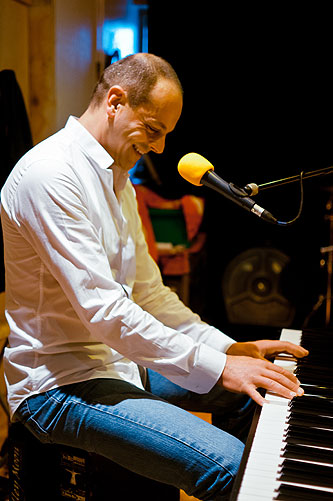 mwe3:
Can you tell the readers where you're from originally and where you
live now and what you like best about it? Have you been to the States
yet?
mwe3:
Can you tell the readers where you're from originally and where you
live now and what you like best about it? Have you been to the States
yet?
Patrick
Molesworth: I
was born just outside Slough, Berkshire in the U.K. I moved around
a bit within the Chiltern Hills in Buckinghamshire but a couple of
years ago, sold up and moved to South Wales where we’d enjoyed
some amazing childhood family holidays. The reality of living here
is very different but Pembrokeshire is a beautiful part of the UK
and we love it. We enjoy fantastic and beautiful coast all around
us. I am still an Englishman at heart and probably quite a typical
one.
No, I've never been to anywhere in the U.S. My main impression of
it is that it's very very big! I would like to go to the U.S. some
time.
mwe3: Is the self-titled Zeelley Moon the first album from the
band? When was the album written and recorded and what were some of
the key events in the lead-up to the writing and recording sessions?
What did you set out to achieve with the album?
Patrick Molesworth: I have recorded solo material before, but
this is the first band album. Most tracks were recorded between 2015
to 2017. 3 tracks were recorded as long ago as 2011 but were always
destined to be part of this album. I set out to make an album to please
myself first and an audience second. It is, to some extent, a personal
expression but it’s not autobiographical. As the songs evolve
sometimes they take on more relevance. The writing has taken place
over a few years, so it’s been an ongoing process taking in some
of life’s events. The lead up to recording was just getting everyone
on board and willing to travel to the studio and spend time.
mwe3: Did you go through a musical education or are you self-taught?
Do you practice, or do you spend most of your time writing and recording
and rehearsing too? Seems like most musicians also have to spend time
as web masters and Facebook participants.
Patrick Molesworth: I’ve had no musical education at all.
I’m not sure if it would have helped.Trouble is, once I’d
started liking what I played from experimenting, it was too late!
I like to think that not having learned musical ‘rules’,
I might have a more original approach, unhindered by convention. I’ll
let others judge that for themselves. Everything I do has come from
sitting at the piano and experimenting until something I like comes
out.
Sometimes I recognize various influences after the event. In more
recent years, the more musically educated contributors to my projects
might tell me I’m playing a minor chord with a diminished 9th
or augmented 5th or something! It’s great... As a band we’ve
rehearsed as necessary. I would like to write with a band but it can
be very frustrating.
Spending
time using the dark art of social media to engage with the public
and promote oneself is hard and doesn’t come naturally to me.
Ideally it’s a job done by someone else. Luckily there are starting
to be folk out there who like what I’m doing and that makes it
a lot easier.
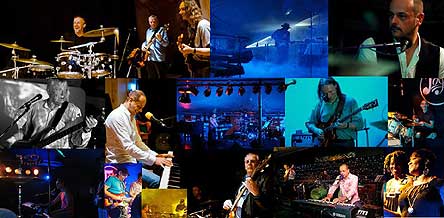 mwe3:
What era of music did you grow up in and who are your favorite artists
and keyboardists? You cite Genesis and Supertramp as influences. Can
you tell us where you’re from originally and how you became interested
in rock and piano / keyboards? What era did you grow up in? Being
in the U.K. you must have had tons of great bands to watch and listen
to. I hear a bit of Mike Pinder’s string like mellotron / chamberlain
and blues sounds in your keyboards.
mwe3:
What era of music did you grow up in and who are your favorite artists
and keyboardists? You cite Genesis and Supertramp as influences. Can
you tell us where you’re from originally and how you became interested
in rock and piano / keyboards? What era did you grow up in? Being
in the U.K. you must have had tons of great bands to watch and listen
to. I hear a bit of Mike Pinder’s string like mellotron / chamberlain
and blues sounds in your keyboards.
Patrick Molesworth: The 1970s and ‘80s I guess is what
I grew up with and certainly the most influential. I didn’t really
have any favorite artists or keyboardists at that time. I had very
eclectic tastes within chart music but found myself a bit dismissive
of pop music for a while though some of it was great. I appreciate
it more now but at the time I aspired for something deeper… maybe
to suit a typical teenage angst. I found my older brother’s album
collection; Pink Floyd, YES, Supertramp and others…
I loved the depth of emotion angst and sophistication. I had no idea
about song structure or what they were playing but I loved it, so
I think my motivation to create a mix of pop, rock, theme and prog
might have come from there. Fiddling with basic major and minor chords
was never going to be enough. I had the aspiration but not the skill
so I laid my fingers on a keyboard until nice chords and sequences
came out… and they did. My influences, I think, really are a
slice of every musical moment that’s ever moved me.
mwe3: What keyboards and synths did you play and record the
Zeelley Moon album with? Do you have a favorite piano sound or brand?
Are you into Steinway pianos or Yamaha keyboards?
Patrick Molesworth: My Nord Stage 2, mainly for the Grand piano,
Roland FP2 and my old faithful Yamaha PSR 540. My favorite piano sound
is the grand and the Nord has some great piano sounds. I can’t
say I have a favorite but Yamaha is very nice. I can’t bear the
non-intuitive nature of the Nord programming itself. Frankly, I just
don’t bother. I’d rather spend time writing than trying
to work it out. Other keyboards are far easier to navigate.
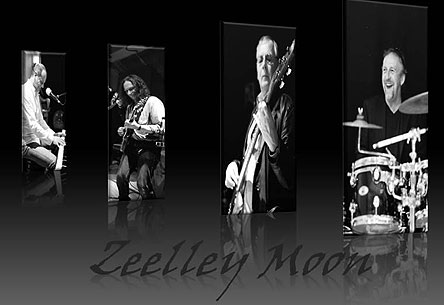 mwe3:
The studio sound is great too. Tell us a bit about recording in Pembrokeshire.
mwe3:
The studio sound is great too. Tell us a bit about recording in Pembrokeshire.
Patrick Molesworth: Thank you, I guess I know how I want things
to sound and Richard Bignell at Area 18 Studios is brilliant. He is
excellent technically but also easy to work with and has a very unbiased
approach. I have a very modest studio at my home in Pembrokeshire
where often piano, keyboard, vocals and backing vocals are recorded.
Well away from the house and with a beautiful view, it’s a very
relaxing place to work. On this album, guitars, bass and drums were
mostly recorded at Area 18 in London. I’ve yet to use the studios
in Wales, though there are some excellent ones which I look forward
to trying out. Recording is hard because even after you’ve spent
all the time writing and then in the studio you always hear things
that make you think should be better.
mwe3: Can you tell us how you met and chose to work with the
other musicians in Zeelley Moon and what do they bring to the album?
You have a number of musicians on the album. Is there a core Zeelley
Moon lineup that you perform shows with?
Patrick Molesworth: I mostly met musicians I’d seen play
and liked their style and they had a good understanding and interpretation
of my compositions. What they have brought to this album is their
intuitive playing, making my ideas a reality. There has tended to
be a core line up for performing, though it has changed a lot over
the years.
mwe3: Also there must be great story behind how you arrived
with the band name? Zeelley Moon is a very unusual name indeed.
Patrick Molesworth: There is a story behind the name but It’s
not very rock and roll. If it was a partnership of… Actually,
maybe all band name stories are like this... I was thinking of a two
word, slightly ambiguous but interesting and unique name. “Moon”
sounds nice after “Keith” or “Paper”, but it needed
a suitably cool first word in front. My ex-boss’ ex son in law’s
sir name was Zealy. I liked its sound and decided it fitted but spelt
with double EEs and LLs so it looks better when it’s scribbled,
hence the “Zeelley” spelling. I googled it and found there
was NO Zeelley Moon of any kind in existence. So, unique music and
unique name!
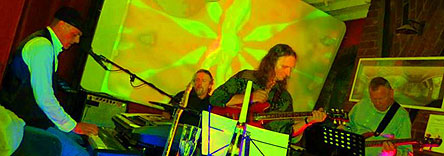 mwe3:
The Zeelley Moon album starts off with a rocking track called “Itchy
Feet”. Funny title but it really rocks. Does the track serve
as a kind of overture for the album and how does the instrumental
side of your music fit in with the overall Zeelley Moon sound? Do
you like writing and recording instrumentals say compared with vocal
tracks? Is that Tony Dubinski doing the guitar solo on the track and
I like the pic of the kid and the cat on the inside cover photo. Your
kid or cat?
mwe3:
The Zeelley Moon album starts off with a rocking track called “Itchy
Feet”. Funny title but it really rocks. Does the track serve
as a kind of overture for the album and how does the instrumental
side of your music fit in with the overall Zeelley Moon sound? Do
you like writing and recording instrumentals say compared with vocal
tracks? Is that Tony Dubinski doing the guitar solo on the track and
I like the pic of the kid and the cat on the inside cover photo. Your
kid or cat?
Patrick Molesworth: You’re in your car hardly moving on
a freeway with a traffic report telling you things are bad in a few
miles. Somehow, typically maybe, it kind of represents where your
life is right now. You tut and moan. You put your CD in the player
and turn it up to escape the monotony. I wanted it on the album but
it didn’t really sit amongst the others, so it became the opening
theme but needed a different name. “Itchy Feet”, implying
dissatisfaction at that moment, rather than a nasty foot condition,
started life as an instrumental almost 26 years ago and I still have
the original demo. Its working title was “Becky Dancing”
because my oldest daughter Becky, at the age of one or two, swayed
in time to it. This remained until I recorded it with the band.
The bass is played on the 2 and 4 during verses instead of 1,2,3,4
– just to get nerdy for a moment. I experimented in writing music
for a long time before making songs with vocals. I don’t particularly
like the sound of my own singing voice, but I do like words so I guess
someone has to sing them. Tony Dubinski does indeed play rhythm and
lead guitar on “Itchy Feet”. I like what he came up with.
The little girl in the inside cover photo is the daughter of a late
friend, a friend who is also the subject on track 3, “Tricks
& Tragedy”. The cat was his. I’ll tell you about him
later…
mwe3: After the energy fueled opening cut, “Smile”
brings things down to earth somewhat with an upbeat track with a message
in it. Is “Smile” a way to find a way back to a more productive
kind of frame of mind and are life’s lessons in “Smile”
from your personal experience or is the track a kind of philosophical
song that applies to just about everyone?
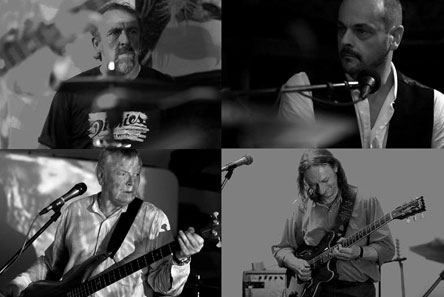 Patrick
Molesworth: “Smile” was written some years back and,
with its indulgent play out solo, tended to be the closing number
in shows for a while. It is very much a philosophical song; the words
of which, people can maybe apply to their own lives. The opening lines
are really about unresolved issues with a lost loved one, but it moves
around a bit to not wasting time and understanding that people have
issues you need to allow for to get on.
Patrick
Molesworth: “Smile” was written some years back and,
with its indulgent play out solo, tended to be the closing number
in shows for a while. It is very much a philosophical song; the words
of which, people can maybe apply to their own lives. The opening lines
are really about unresolved issues with a lost loved one, but it moves
around a bit to not wasting time and understanding that people have
issues you need to allow for to get on.
They say time is a healer so maybe “Smile” kind of represents
that idea. All my songs are a mixture of ideas, sometimes taking my
own experiences and expanding them to be everyone’s experiences.
As the songs develop I can often find my own meaning in them relating
to me but I hope others will find their own meaning.
mwe3: The picture for “Smile” has an open book facing
the song lyrics. What does the open book signify and did you choose
all the artwork for the lyrics sheet. Are the photos on the song /
lyrics page there as symbolism to help explain the tracks?
Patrick Molesworth: The open, and blank, book is a lovely image
for me. It could be that a breeze is blowing the pages and we don’t
know what page it will choose. It could be a diary of your memories
but being blank it could be all the things you never wrote or never
said. Yes, I chose all the artwork. Mostly, they are designed to hint
at the meaning of the song or have some relevance. I love pictures
and paintings that inspire debate or that can be interpreted differently.
mwe3: Was “Tricks And Tragedy” written specifically
about someone? It seems like the song tries to paint a brighter face
on loss and how the people who inspired us and even brought us into
existence often leave us to face our own futures. The song moves from
a kind of Elton John / Supertramp inspired verse into a very symphonic
middle section. Is that what you do best, combining catchy hooks with
a progressive instrumental bridge section? The photo with the lyrics
is haunting, it’s just like watching death / rebirth in action.
Any thoughts on death or dying or do you believe in rebirth?
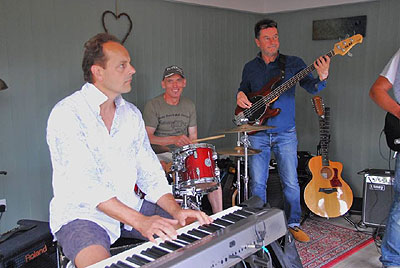 Patrick
Molesworth: You’re exactly right Robert! “Tricks and
Tragedy”, as it evolved, took on a meaning that was unconscious
at first but yes, it is about a good friend who was an inspirational
larger than life character with a great voice and like a brother to
one of my best friends for whom it was a huge loss. The song begins
by describing the social and musical lives of our collective musical
friends before a totally unexpected heart attack. It continues over
the period where his life hang in the balance for months and sadly
then ended but a reprise reminds me of happy, sad crazy memories of
him.
Patrick
Molesworth: You’re exactly right Robert! “Tricks and
Tragedy”, as it evolved, took on a meaning that was unconscious
at first but yes, it is about a good friend who was an inspirational
larger than life character with a great voice and like a brother to
one of my best friends for whom it was a huge loss. The song begins
by describing the social and musical lives of our collective musical
friends before a totally unexpected heart attack. It continues over
the period where his life hang in the balance for months and sadly
then ended but a reprise reminds me of happy, sad crazy memories of
him.
I don’t stick to any formula or song structure... I just kind
of go with my instinct but I always loved it when a song goes off
on a tangent. The fact there are two on this album is a coincidence.
I would love to have written “Live And Let Die”. What a
song! I love symphonic melancholy. I thought of a heart monitor screen,
representing end of life but that seemed too blunt and frankly unsympathetic.
The long exposure photo is of a torch being moved to emulate a heartbeat.
I was very happy with this photo.
I’m a big believer in human nature... good, bad, basic, hidden,
all of it. No, sorry, I believe that when we die, we die but people
choose ideas of rebirth or reincarnation to suit themselves. I have
a theory that if you took ten babies with no knowledge of the society
they’d come from and left them on a virgin planet for long enough,
their successors would first worship the sun and rain and anyone who
claimed to control it, develop religion, possibly in the absence of
universal law, faith, after life ideas and, as they modernize and
become a more sophisticated society, graduate psychological problems
too.
There may well be unknown powers and forces we can’t consciously
control and senses we have lost as modern humans. Who knows? The crazy
theories are no more crazy than the science... I keep my late father’s
watch and feel like it means something to wear it. I also allow in
the influence people I have known and lost...hmmm.
mwe3: “The Tick Tock” is another reality type track
with a great message in it. Never put off till tomorrow is a kind
of universal message, and the sun will shine much brighter tomorrow
so why procrastinate? Is time the greatest teacher of all and how
do you apply this complex message in your own life?
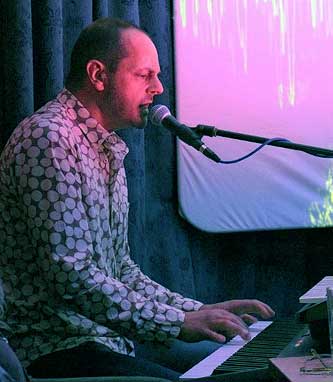 Patrick
Molesworth: You understood the song dead right again Robert. The
clock keeps ticking regardless of whether we get off our butts. I
might be waiting for the sun to shine brighter but maybe I just need
to learn to do things in the rain. Time is perhaps the greatest teacher
yes. I apply the message of “The Tick Tock” very badly in
some aspects of my life.
Patrick
Molesworth: You understood the song dead right again Robert. The
clock keeps ticking regardless of whether we get off our butts. I
might be waiting for the sun to shine brighter but maybe I just need
to learn to do things in the rain. Time is perhaps the greatest teacher
yes. I apply the message of “The Tick Tock” very badly in
some aspects of my life.
You asked about death before. I think instead of thinking of death
as something way over an unknown horizon, it might be better to think
of our demise as being a fixed point we are tied to so no matter what
path we take, we are being reeled in slowly. What about counting downwards
after our 40th birthday? Not to avoid facing our age but to embrace
the inevitability of our death. Maybe with this mindset we would
get off our butts more and be better to ourselves and to others. Deep
eh?
mwe3: Is “See Me Fly” about family life? You speak
about a mom and dad in the song lyrics. How do to lyrics fit in with
the driving beat of the track? There’s also a kind of introspective
middle section in the track with a beautiful string like section but
it’s one of the most rocked out tracks on the Zeelley Moon CD.
Is that a pic of you in the “See Me Fly” lyrics page? “See
Me Fly” sort of segues into the next track “Weight Of The
World” and the two tracks connect lyrically too. The lyrics on
“Weight Of The World” are kind of a rebirth of a defeated
person. How did you connect the two ideas? Fly and Weight… dealing
with an oxymoron?
Patrick Molesworth: “See Me Fly” and “Weight
Of The World” are really two separate songs and I combined them
partly because musically I liked it but also because it expresses
the mindset of the first person and his observations of the ‘defeated’
other. Almost opposites and yet maybe much in common… So there
isn’t really an oxymoron, for me anyway.
During “See Me Fly”, he describes different aspects of life
in which he adopts a similar stubbornness to not be blown out or let
down, keeping up his guard and continuing to try prove himself after
the event. It could be the exaggerated expression of not being seen
to stand still, not allowing oneself to be vulnerable.
“Weight Of The World” deals with a defeated person, not
a lover or ex-lover and sadly no rebirth as yet; the last line being
“I can see you going round and round”… The last section
is a reprise of the previous song. It is indeed me in the lyric page
picture.
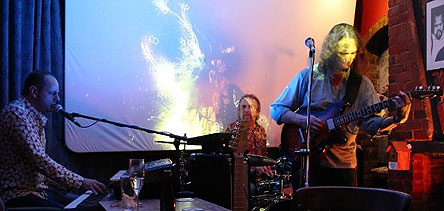 mwe3:
“Designer Crime” is pretty cynical lyrically, was that how
you wrote it? It almost sounds like people are programmed like beings
controlled by TV. The artwork with lyrics with the urinals is compelling!
What was your train of thought on “Designer Crime”? The
guitar work is great on that track with fuzz box sound and crowd like
voices in it. Pretty brilliant track.
mwe3:
“Designer Crime” is pretty cynical lyrically, was that how
you wrote it? It almost sounds like people are programmed like beings
controlled by TV. The artwork with lyrics with the urinals is compelling!
What was your train of thought on “Designer Crime”? The
guitar work is great on that track with fuzz box sound and crowd like
voices in it. Pretty brilliant track.
Patrick Molesworth: Thank you. “Designer Crime” is
really a major whinge. This guy is pissed off. It’s an angry
song. He’s cynical about life and in despair of the modern world
or the bits of it he doesn’t relate to. It jumps from first to
second person a bit which is a bit of a habit of mine.
The photo is genuine. I don’t tend to hang around in public toilets
but I waited for this one to be empty before taking the shot. I felt
like it supported the theme of luxury problems of our part of this
world. There is a video for “Designer Crime” which culminates
in a guy jumping off the Golden Gate Bridge but it’s not been
published yet.
mwe3: “Living On The Water” makes some interesting
points and has a great groove and melodic edge to it. Does living
on the water help you find a more positive side to life and is it
therapeutic to spend time on the water? Is that one of the more string
sweeping arrangements on the album? You can almost hear real strings
in there, how do you simulate strings in your keyboard sound, seems
better sounding than real strings.
Patrick Molesworth: “Living On The Water” kind of
started out when I was seriously considering selling up and living
on a boat. Giving up something that perhaps felt like it was important.
In the end I borrowed some money and bought a camper van! Maybe everyone’s
got their own equivalent of living on the water part; a place or a
state of mind that gives comfort from the less nice bits of life.
It would be great to have real strings. It would need to be an 80
piece for the sound I’d like.
Interestingly, I use my old Yamaha PSR 540 keyboard for the strings.
There is a slightly soft attack and the large string section sound
is already pretty good for an old keyboard, but I play and record
the different octaves to give a more realistic feel. The Nord has
some amazing sounds, but life really is just too short. It should
be called Nerd, not Nord.
mwe3: “Feel So Real” is a pretty straight forward
track like a Peter Frampton kind of sound. There’s a cool instrumental
break in the middle too. I can’t tell if it’s a positive
song or more a blues. But the pictures of the naked people on the
lyric page! Where did that come from? (lol) I love the lady with the
Zeelley Moon shopper.
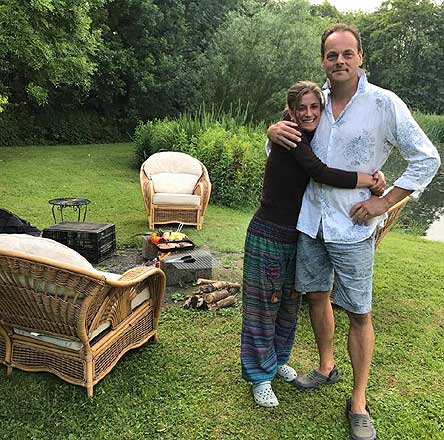 Patrick
Molesworth: The lyrics in “Feel So Real” mostly came
from a song I’d written some years back about friendship. For
me its message is generally positive in that it’s encouraging
the listener to live according to the opening spoken quote which is
repeated in the choruses. The sound of the song evolved naturally
without any conscious influence. The naked people are certainly “doing
what they know will be seen to be right looking back etc….”
There is a story behind this picture though it’s not mine. If
some Zeelley Moon merchandise comes about I guess it would have to
be large paper carrier bags like the one in the picture!
Patrick
Molesworth: The lyrics in “Feel So Real” mostly came
from a song I’d written some years back about friendship. For
me its message is generally positive in that it’s encouraging
the listener to live according to the opening spoken quote which is
repeated in the choruses. The sound of the song evolved naturally
without any conscious influence. The naked people are certainly “doing
what they know will be seen to be right looking back etc….”
There is a story behind this picture though it’s not mine. If
some Zeelley Moon merchandise comes about I guess it would have to
be large paper carrier bags like the one in the picture!
mwe3: How about “Out Of The Blue”. It’s the
centerpiece of the Zeelley Moon album. It has a great YES kind of
sound. It’s kind of progressive but there’s also a kind
of early ‘70s rock vibe to it ala Frampton for example. Is the
track autobiographic, did you write it for your wife and why did you
close the album with “Out Of The Blue”? Again great symphonic
string sounds.
Patrick Molesworth: “Out Of The Blue” started just
as a chord sequence I liked over which one note could suit every chord.
The words are dedicated to Orsola. I don’t really do pure love
songs but Orsola coming into my life warranted a song dedicated to
her. She is hugely supportive and a big influence and definitely my
other half as we sometimes say here in the UK. The final arrangement
very much reflects my meeting of Orsola and the ‘out of the blue’
nature of our almost immediate coming together.
I asked Mike Bennett, the drummer on this track, to think “Comfortably
Numb” by Pink Floyd, which also gave me the feel for the orchestration…
lots of brass but also strings. I closed the album with this as, although
the songs and lyrics are universal and slightly ambiguous, they do
also represent a chapter in my life and “Out Of The Blue”
is the story to date so it was natural to close with it.
mwe3: What’s the reaction been to your music and the Zeelley
Moon album in the UK and what would you like people to think about
your music on this album? What’s coming down the road for your
music and other things going on in 2018 and beyond?
Patrick Molesworth: I’ve had some fantastic reactions
to this album in the UK and enjoyed a fair amount of radio play and
had some enthusiastic reviews and really nice comments on radio. Not
everyone gets it but progressive rock fans seem to like it. It’s
much more accessible than a lot of pure prog.
I didn’t set out to make a prog song or album. I write very much
to please myself, but I like to think the term “progressive”
can be applied to any genre. Maybe mine is middle of the road prog?
I would like  people
to think it’s original, even unique with a slightly different
approach and just a bit different to things they’ve heard before.
Life has been quite hectic as we’ve moved to the coast in South
Wales in the UK, which has given me the freedom to dedicate more time
to music. For now it’s about promoting the album and getting
people to hear Zeelley Moon. I have a lot of material I’m confident
fans of the current album will like. There will be another Zeelley
Moon another album…
people
to think it’s original, even unique with a slightly different
approach and just a bit different to things they’ve heard before.
Life has been quite hectic as we’ve moved to the coast in South
Wales in the UK, which has given me the freedom to dedicate more time
to music. For now it’s about promoting the album and getting
people to hear Zeelley Moon. I have a lot of material I’m confident
fans of the current album will like. There will be another Zeelley
Moon another album…



 With
many long respected artists backing off from making what is now known
as “physical” product, and now going the download / web-based
approach, (which is the trend), so then along comes U.K. based Zeelley
Moon with their self-titled album debut. And a winner of an album
it is. With appealing hard bound book like CD packaging, the artwork
is excellent with complete lyrics and intriguing and sometimes shocking
photography. A well-timed 21st century modern rock quartet, Zeelley
Moon centers around the songs, vocals and keyboards of Patrick Molesworth.
Not exclusively considered prog-rock, and sounding more like Phil
Collins era Genesis than classic Genesis, the ten cut CD sounds like
modern pop-rock and group leader / composer Patrick Molesworth sounds
very influenced by piano rock legends like Billy Joel and Elton John.
The sizzling electric guitars of Tony Dubinski combined with
Tony Dodd (bass) and Geoff Bolam (bass, guitar), gives
the sound a cleverly tracked Frampton meets Supertramp influence.
Commenting on Zeelley Moon being accepted and even praised by progressive
rock fans in the U.K. and beyond, Patrick tells mwe3.com “I
didn’t set out to make a prog song or album; I write very much
to please myself, but I like to think the term “progressive”
can be applied to any genre. Maybe mine is middle of the road prog?
I would like people to think it’s original, even unique with
a slightly different approach and just a bit different to things they’ve
heard before.” Different musicians play on various tracks
while keeping the rock quartet sound in focus. Even with further refinement
of their impressive productions and bountiful melodic ideas, on what
will hopefully be future band recordings, the musical vision of Zeelley
Moon is well on the way to developing into a progressive rock force
to be reckoned with.
With
many long respected artists backing off from making what is now known
as “physical” product, and now going the download / web-based
approach, (which is the trend), so then along comes U.K. based Zeelley
Moon with their self-titled album debut. And a winner of an album
it is. With appealing hard bound book like CD packaging, the artwork
is excellent with complete lyrics and intriguing and sometimes shocking
photography. A well-timed 21st century modern rock quartet, Zeelley
Moon centers around the songs, vocals and keyboards of Patrick Molesworth.
Not exclusively considered prog-rock, and sounding more like Phil
Collins era Genesis than classic Genesis, the ten cut CD sounds like
modern pop-rock and group leader / composer Patrick Molesworth sounds
very influenced by piano rock legends like Billy Joel and Elton John.
The sizzling electric guitars of Tony Dubinski combined with
Tony Dodd (bass) and Geoff Bolam (bass, guitar), gives
the sound a cleverly tracked Frampton meets Supertramp influence.
Commenting on Zeelley Moon being accepted and even praised by progressive
rock fans in the U.K. and beyond, Patrick tells mwe3.com “I
didn’t set out to make a prog song or album; I write very much
to please myself, but I like to think the term “progressive”
can be applied to any genre. Maybe mine is middle of the road prog?
I would like people to think it’s original, even unique with
a slightly different approach and just a bit different to things they’ve
heard before.” Different musicians play on various tracks
while keeping the rock quartet sound in focus. Even with further refinement
of their impressive productions and bountiful melodic ideas, on what
will hopefully be future band recordings, the musical vision of Zeelley
Moon is well on the way to developing into a progressive rock force
to be reckoned with.  mwe3:
Can you tell the readers where you're from originally and where you
live now and what you like best about it? Have you been to the States
yet?
mwe3:
Can you tell the readers where you're from originally and where you
live now and what you like best about it? Have you been to the States
yet?  mwe3:
What era of music did you grow up in and who are your favorite artists
and keyboardists? You cite Genesis and Supertramp as influences. Can
you tell us where you’re from originally and how you became interested
in rock and piano / keyboards? What era did you grow up in? Being
in the U.K. you must have had tons of great bands to watch and listen
to. I hear a bit of Mike Pinder’s string like mellotron / chamberlain
and blues sounds in your keyboards.
mwe3:
What era of music did you grow up in and who are your favorite artists
and keyboardists? You cite Genesis and Supertramp as influences. Can
you tell us where you’re from originally and how you became interested
in rock and piano / keyboards? What era did you grow up in? Being
in the U.K. you must have had tons of great bands to watch and listen
to. I hear a bit of Mike Pinder’s string like mellotron / chamberlain
and blues sounds in your keyboards. mwe3:
The studio sound is great too. Tell us a bit about recording in Pembrokeshire.
mwe3:
The studio sound is great too. Tell us a bit about recording in Pembrokeshire. mwe3:
The Zeelley Moon album starts off with a rocking track called “Itchy
Feet”. Funny title but it really rocks. Does the track serve
as a kind of overture for the album and how does the instrumental
side of your music fit in with the overall Zeelley Moon sound? Do
you like writing and recording instrumentals say compared with vocal
tracks? Is that Tony Dubinski doing the guitar solo on the track and
I like the pic of the kid and the cat on the inside cover photo. Your
kid or cat?
mwe3:
The Zeelley Moon album starts off with a rocking track called “Itchy
Feet”. Funny title but it really rocks. Does the track serve
as a kind of overture for the album and how does the instrumental
side of your music fit in with the overall Zeelley Moon sound? Do
you like writing and recording instrumentals say compared with vocal
tracks? Is that Tony Dubinski doing the guitar solo on the track and
I like the pic of the kid and the cat on the inside cover photo. Your
kid or cat? Patrick
Molesworth: “Smile” was written some years back and,
with its indulgent play out solo, tended to be the closing number
in shows for a while. It is very much a philosophical song; the words
of which, people can maybe apply to their own lives. The opening lines
are really about unresolved issues with a lost loved one, but it moves
around a bit to not wasting time and understanding that people have
issues you need to allow for to get on.
Patrick
Molesworth: “Smile” was written some years back and,
with its indulgent play out solo, tended to be the closing number
in shows for a while. It is very much a philosophical song; the words
of which, people can maybe apply to their own lives. The opening lines
are really about unresolved issues with a lost loved one, but it moves
around a bit to not wasting time and understanding that people have
issues you need to allow for to get on. Patrick
Molesworth: You’re exactly right Robert! “Tricks and
Tragedy”, as it evolved, took on a meaning that was unconscious
at first but yes, it is about a good friend who was an inspirational
larger than life character with a great voice and like a brother to
one of my best friends for whom it was a huge loss. The song begins
by describing the social and musical lives of our collective musical
friends before a totally unexpected heart attack. It continues over
the period where his life hang in the balance for months and sadly
then ended but a reprise reminds me of happy, sad crazy memories of
him.
Patrick
Molesworth: You’re exactly right Robert! “Tricks and
Tragedy”, as it evolved, took on a meaning that was unconscious
at first but yes, it is about a good friend who was an inspirational
larger than life character with a great voice and like a brother to
one of my best friends for whom it was a huge loss. The song begins
by describing the social and musical lives of our collective musical
friends before a totally unexpected heart attack. It continues over
the period where his life hang in the balance for months and sadly
then ended but a reprise reminds me of happy, sad crazy memories of
him.  Patrick
Molesworth: You understood the song dead right again Robert. The
clock keeps ticking regardless of whether we get off our butts. I
might be waiting for the sun to shine brighter but maybe I just need
to learn to do things in the rain. Time is perhaps the greatest teacher
yes. I apply the message of “The Tick Tock” very badly in
some aspects of my life.
Patrick
Molesworth: You understood the song dead right again Robert. The
clock keeps ticking regardless of whether we get off our butts. I
might be waiting for the sun to shine brighter but maybe I just need
to learn to do things in the rain. Time is perhaps the greatest teacher
yes. I apply the message of “The Tick Tock” very badly in
some aspects of my life.  mwe3:
“Designer Crime” is pretty cynical lyrically, was that how
you wrote it? It almost sounds like people are programmed like beings
controlled by TV. The artwork with lyrics with the urinals is compelling!
What was your train of thought on “Designer Crime”? The
guitar work is great on that track with fuzz box sound and crowd like
voices in it. Pretty brilliant track.
mwe3:
“Designer Crime” is pretty cynical lyrically, was that how
you wrote it? It almost sounds like people are programmed like beings
controlled by TV. The artwork with lyrics with the urinals is compelling!
What was your train of thought on “Designer Crime”? The
guitar work is great on that track with fuzz box sound and crowd like
voices in it. Pretty brilliant track. Patrick
Molesworth: The lyrics in “Feel So Real” mostly came
from a song I’d written some years back about friendship. For
me its message is generally positive in that it’s encouraging
the listener to live according to the opening spoken quote which is
repeated in the choruses. The sound of the song evolved naturally
without any conscious influence. The naked people are certainly “doing
what they know will be seen to be right looking back etc….”
There is a story behind this picture though it’s not mine. If
some Zeelley Moon merchandise comes about I guess it would have to
be large paper carrier bags like the one in the picture!
Patrick
Molesworth: The lyrics in “Feel So Real” mostly came
from a song I’d written some years back about friendship. For
me its message is generally positive in that it’s encouraging
the listener to live according to the opening spoken quote which is
repeated in the choruses. The sound of the song evolved naturally
without any conscious influence. The naked people are certainly “doing
what they know will be seen to be right looking back etc….”
There is a story behind this picture though it’s not mine. If
some Zeelley Moon merchandise comes about I guess it would have to
be large paper carrier bags like the one in the picture!